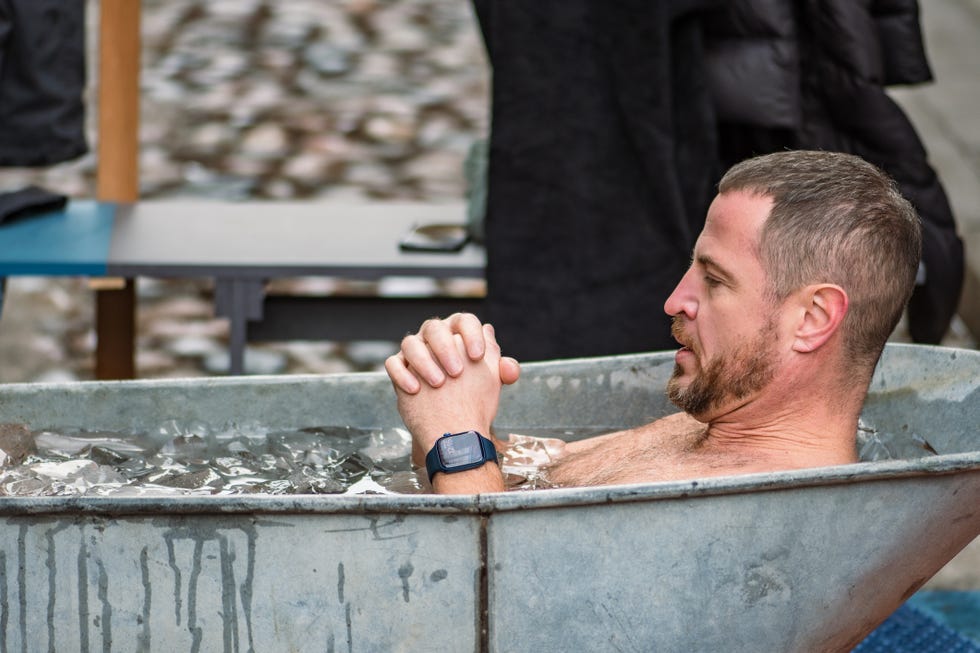ICE BATHS, OR cold-water immersion (CWI), can be a hugely polarising topic when discussing the potential benefits it provides. For every detractor who looks to dispel any notion they are worthwhile, there are plenty of proponents who swear by their positive properties. A new meta-study, however, highlights that CWI provides limited effects on health, suggesting the purported benefits are exaggerated.
The research and methods
In the most-comprehensive systematic review and meta-analysis of its kind, published in PLOS ONE, researchers from the University of South Australia studied the impacts of CWI on health and wellbeing from 11 separate studies involving 3,177 participants. Evaluating the physiological, psychological and cognitive effects of CWI, 13 different metrics were examined within the study, including: sleep, stress, fatigue, energy, skin health, immunity, inflammation, mental wellbeing, depression, anxiety, mood, concentration, and alertness.
‘CWI has gained widespread popularity among the general public, despite most evidence focusing solely on its effects among athletic populations,’ the research states. ‘This knowledge gap is particularly concerning given the increase in consumer adoption of CWI, with largely unsupported claims in mainstream media about its benefits for physical health and mental wellbeing.’
Participants were immersed at least to their chest level in temperatures ranging from 7°C to 15°C, while exposure times varied dramatically between 30 seconds and two hours.
Why ice baths have limited effects on health
A key reason why athletes choose CWI directly after training or performing in their particular discipline is in order to reduce both muscle soreness and inflammation. The research, however, found the opposite happened, with the cold temperatures causing significant increase in inflammation immediately and one hour after CWI.
‘At first glance this seems contradictory,’ study author Ben Singh, PhD, said. ‘The immediate spike in inflammation is the body’s reaction to the cold as a stressor. It helps the body adapt and recover and is similar to how exercise causes muscle damage before making muscles stronger, which is why athletes use it despite the short-term increase.’
While this acute inflammatory response is worthwhile for elite athletes, the general population needs to understand the risks associated with such large spikes in inflammation. ‘Knowing this,’ Singh added, ‘people with pre-existing health conditions should take extra care if participating in cold-water immersion experiences as the initial inflammation could have detrimental health impacts.’

If they boost your mood, great, but new science says ice baths are unlikely to provide significant health benefits
Researchers also found little evidence to support claims that cold-water immersion boosts immunity and mood over an extended period. There are time-dependant factors to consider regarding CWI, notably that it only reduced stress levels for around 12 hours post exposure. After that, levels returned to baseline.
Immune function showed no significant immediate changes either, though long-term benefits were observed in this respect. Contrastingly, quality of life showed short-term improvements, but they didn’t continue past the 90-day mark.
‘This review highlights that there is currently limited high-quality evidence on the impacts of CWI for the general population,’ the research states. ‘Early evidence suggests that CWI has significant impacts on inflammation, stress, immunity, quality of life, and sleep. However, the impacts of CWI also appeared highly time-dependent, with different impacts on stress, inflammation, and immunity observed immediately following CWI, across the day after CWI, and at longer-term follow-up.’
But there are still some benefits to ice baths?
A key aspect noted in the research found a 29% reduction in sickness absence among participants who took cold showers. But while their illnesses lasted just as long as everyone else’s when they did get sick, they were able to cope better with any pathogens rather than preventing it entirely.
The aforementioned 90-day period of improvement in quality of life is also a significant amount of time, with those who took cold showers for as little as 30 seconds per day for 30 days returning better scores in key markers. Though there are limitations within the research, sleep quality improved among participants.
‘We also found some links to cold-water immersion and better sleep outcomes, but the data was restricted to males, so its broader application is limited.’
What next?
Essentially, more research is needed to determine the true effectiveness of CWI, though this initial meta-analysis is sound – albeit incomplete – starting ground. The study notes that more emphasis is needed on the long-term effects of CWI, with follow-ups essential in evaluating the sustained effects on health outcomes.
Larger and more diverse samples are also suggested, which will help to improve the reliability of findings while also providing more information on how certain age groups and populations are affected by CWI. Researchers also suggest determining whether or not there are optimal temperatures, durations and frequency of exposure for the best outcomes.
This article originally appeared on Men’s Health UK.
Related:















